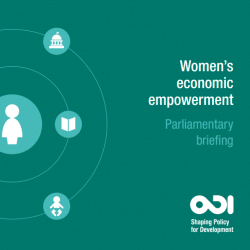- The Overseas Development Institute’s (ODI’s) analysis shows that gender discrimination means that women often end up in insecure, low-wage and exploitative jobs, hardly participate in shaping economic and social policies, and have less access to economic assets like land and loans.
- Where women’s economic advancement has been successful, the benefits to society and families are shown to be extensive. Recent estimates suggest that gender parity has the potential to boost global GDP by USD 12–28 trillion by 2025.
- Realizing women’s potential requires concerted, targeted efforts that prioritize women’s specific needs, preferences and experiences. Recommendations for policymakers include: 1) earmarking funding (i.e. scaling up gender-specific financial resourcing); 2) supporting women’s organizations and building coalitions between relevant government, private and civil society actors; 3) adapting policies and approaches to political realities and structures that are specific to location and context; and 4) incorporating women’s views and experiences into policy making, which requires investing in data collection that also targets hard to reach, base of the pyramid women.











